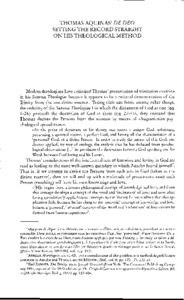Por favor, use este identificador para citar o enlazar este ítem:
https://repositorio.uca.edu.ar/handle/123456789/12849| Título: | Thomas Aquinas' de deo setting the record straight on his theological method | Autor: | Smith, Timothy L. | Palabras clave: | METODO; TEOLOGIA; TRINIDAD; DIOS; PRUEBAS DE LA EXISTENCIA DE DIOS; Tomás de Aquino, Santo, 1225?-1274 | Fecha de publicación: | 1998 | Editorial: | Pontificia Universidad Católica Argentina. Facultad de Filosofía y Letras | Cita: | Smith, T. L. Thomas Aquinas' de deo setting the record straight on his theological method [en línea]. Sapientia. 1998, 53 (203). Disponible en: https://repositorio.uca.edu.ar/handle/123456789/12849 | Resumen: | Abstract: Modern theologians have criticized Thomas' presentation of trinitarian doctrine in his Summa Theologiae because it appears to be a rational demonstration of the Trinity from the one divine essence. Taking their cue from, among other things, the ordering of the Summa Theologiae I in which the discussion of God as one (qq. 1-26) preceeds the discussion of God as three (qq. 27-43), they contend that Thomas derives the Persons from the essence by means of «Augustianian psychological speculations». «At the point of departure of his theory, one meets a unique God, subsisting, possessing a spiritual nature, a perfect God, and having all the characteristics of a `personal' God, of a divine Person. In order to study the nature of this God, our doctor applied, by way of analogy, the analysis that he has deduced from psychological observations [...] he proclaims the distinction between God speaking and his Word, between God loving and his Love»1. Thomas' considerations of the intellectual acts of knowing and loving in God are read as leading to the same well-known quandary in which Anselm found himself2. That is, if we attempt to derive the Persons from such acts in God (taken as the divine essence), then we will end up with a multitude of processions since each Person (resulting) will have his own knowledge and love. «[F]e begins from a human philosophical concept of knowledge and love, and from this concept develops a concept of the word and `inclination' of love; and now, after having speculatively applied these concepts to the Trinity, he must admit that this application fails, because he has clung to the 'essentiar concept of knowledge and love, because a 'personal', `notionar concept of the word and `inclination' of love cannot be derived from human experience». | URI: | https://repositorio.uca.edu.ar/handle/123456789/12849 | ISSN: | 0036-4703 | Disciplina: | FILOSOFIA | Derechos: | Acceso abierto | Fuente: | Sapientia. 1998, 53 (203) |
| Aparece en las colecciones: | SAP - 1998 Vol LIII nro. 203 |
Ficheros en este ítem:
| Fichero | Descripción | Tamaño | Formato | |
|---|---|---|---|---|
| thomas-aquinas-deo.pdf | 743,12 kB | Adobe PDF |  Visualizar/Abrir |
Visualizaciones de página(s)
42
comprobado en 27-abr-2024
Descarga(s)
195
comprobado en 27-abr-2024
Google ScholarTM
Ver en Google Scholar
Este ítem está sujeto a una Licencia Creative Commons

